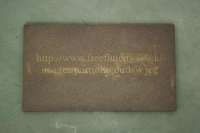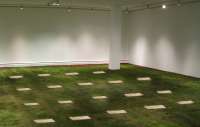Kevin Day Dead Links In The Weak Universalism, Boris Groys, expanding on Agamben‟s „messianic knowledge,‟ argues that time, with the exacerbation of technological progress, has been increasingly contracting, shrinking to microscopic intervals.1 This technological mediation of time manifests itself most strongly on the Internet, where the theoretically archival predilection and the pragmatic penchant for constant renewal are in a perpetual oscillation and opposition. Kierkegaard argues that the stasis of a monument aids the psyche's function to appease itself in the face of the transitory nature of life.2 Conversely, Freud argues that it is precisely the said transitory nature that bestows meaning onto life.3 How does this figure on the Internet, where hyperlinks get constructed and break down ad nauseam? A gravestone for an obsolete web page is inherently futile, given the volatility of the net: web pages can malfunction and get reconstructed at any time. Intended to be an absurd edifice, the archival characteristic of a cemetery for dead links is rendered meaningless due to the fluctuating quality of the Internet. Neither the monument for subconscious pacification nor the promise for a meaning-granting end is guaranteed. In this age, what we are anticipating and what we have forgotten have conflated into a state of flux; experiences now lie somewhere between permanent scarcity of time and petrified reification of time. 1 Boris Groys, “The Weak Universalism,” e-flux, no. 15 (2010): 1-12. 2 Søren Kierkegaard, The Concept of Dread, trans. Walter Lowrie (Princeton: University Press, 1844), pp. 140-142. 3 Sigmund Freud, Beyond the Pleasure Principle, trans. James Strachey (New York: Liveright Publishing, 1950), p. 50-52.
Kevin Day Dead Links In The Weak Universalism, Boris Groys, expanding on Agamben‟s „messianic knowledge,‟ argues that time, with the exacerbation of technological progress, has been increasingly contracting, shrinking to microscopic intervals.1 This technological mediation of time manifests itself most strongly on the Internet, where the theoretically archival predilection and the pragmatic penchant for constant renewal are in a perpetual oscillation and opposition. Kierkegaard argues that the stasis of a monument aids the psyche's function to appease itself in the face of the transitory nature of life.2 Conversely, Freud argues that it is precisely the said transitory nature that bestows meaning onto life.3 How does this figure on the Internet, where hyperlinks get constructed and break down ad nauseam? A gravestone for an obsolete web page is inherently futile, given the volatility of the net: web pages can malfunction and get reconstructed at any time. Intended to be an absurd edifice, the archival characteristic of a cemetery for dead links is rendered meaningless due to the fluctuating quality of the Internet. Neither the monument for subconscious pacification nor the promise for a meaning-granting end is guaranteed. In this age, what we are anticipating and what we have forgotten have conflated into a state of flux; experiences now lie somewhere between permanent scarcity of time and petrified reification of time. 1 Boris Groys, “The Weak Universalism,” e-flux, no. 15 (2010): 1-12. 2 Søren Kierkegaard, The Concept of Dread, trans. Walter Lowrie (Princeton: University Press, 1844), pp. 140-142. 3 Sigmund Freud, Beyond the Pleasure Principle, trans. James Strachey (New York: Liveright Publishing, 1950), p. 50-52.

